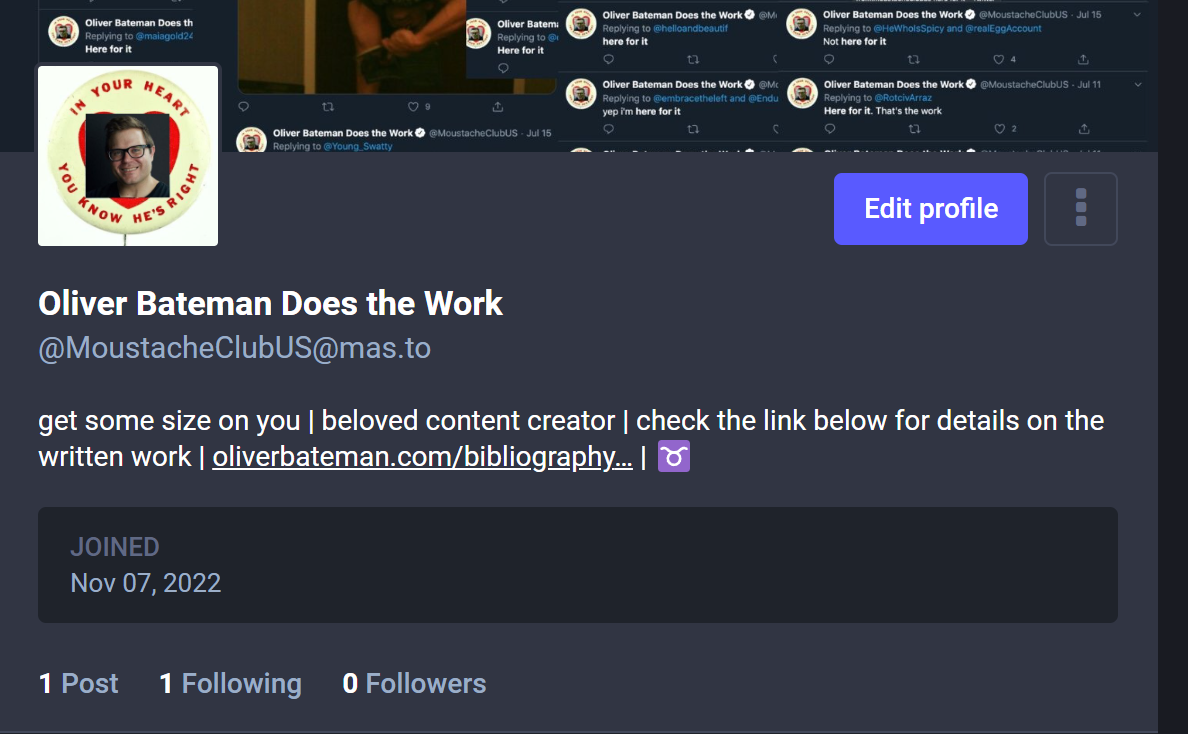Earlier this week, New York Times columnist Paul Krugman joined the open-source social framework Mastodon. Citing concerns about a “Muskocalypse” that would result in a “loss of critical mass” — whatever that means — the Nobel Prize-winning economist immediately began struggling with Mastodon’s interface. “So far things not going well,” he wrote on Twitter.
Although I have no particular problems with Twitter, I decided to follow Krugman’s example and see if Mastodon offered a better user experience. I also wanted to take a look at Tribel, the “pro-democracy” alternative to Twitter operated by Occupy Democrats founders Rafael and Omar Rivero, as some of my most treasured media acquaintances have laid down virtual stakes there in the event of the aforementioned “Muskocalypse”.
Since Krugman was already homesteading on Mastodon’s digital frontier, I decided to go there first. The sign-up was a bit convoluted, as users are required to select a server. The bare-bones “mas.to” server is at the bottom of a long list of other servers dedicated to niche interests such as German heavy metal, maths, LGBT tech, and so on. Once there, I attempted to follow Krugman, but because I had joined mas.to instead of mastodon.social I couldn’t simply follow him, seeing as his profile page is on a different server from mine. I needed to copy the URL, paste it into the search field, find the account, and then follow him (he still hasn’t approved my request).

As for the actual posting interface, it’s nothing special. I “tooted” a post quite similar to my typical “tweeted” Twitter content, using hashtags to do so, and eventually received a like from another account. Since my feed currently consists of nothing but Krugman’s Twitter posts, I checked out what was trending elsewhere on the server. #FotoMontag, the top-trending hashtag, was a fascinating mishmash of random pictures, including one of Candice Kloss, a social media sex star best known for dissolving $20,000 worth of fillers she had injected into her body in order to restore her “natural beauty.”
Mastodon was inoffensive but mechanically awkward. What I encountered on Tribel, however, was truly staggering: an almost nonfunctional interface, with several fields that simply can’t be filled out due to unresponsive dropdown menus. The company’s founders, who achieved a certain degree of notoriety for alleging that former South Carolina politician Nikki Haley had changed her first name to sound more “white” and more recently raised more than $800,000 in September 2022 that they failed to donate to Democratic candidates, certainly spared every expense on this service.
While Mastodon is a mess, Tribel is the sort of pick-your-political-party cash grab commonly associated with the likes of Gab, Parler, and Truth Social — the latter of which at least offers a more functional interface. The site, which features an always-on support chatbot as if it were an e-commerce site, crashed when I attempted to upload a picture to the “Personal Photos” section.

It is possible to upload photos on Tribel posts, at least. When I went to make my first post, I was told to select an “audience” with which to share it — Tribel’s unique feature that allows users to control the direction of the content. Unfortunately, there was no “Journalism” audience, so I instead shared my “#DoTheWork” post with “Activism-Volunteering,” which seemed appropriate. A review of “gold star contributors” who have earned the most likes on Tribel returned a list headed by Venus Thomas, OMG politics and Fun, The Calling of the Crow, Rock Wishing, and Barry S.
There are other contenders for Twitter users, such as Twitter founder Jack Dorsey’s decentralised Bluesky Social app, which has not yet approved my request to join its private beta. All of them have their faults, and few will offer what Twitter does: a huge network already in place, with a functional if mediocre interface. At any rate, regardless of whether Krugman stays on the site or chooses to leave like former pro wrestler Mick Foley and singer Sara Bareilles, we can all rest assured that every step of the process will be painstakingly documented on Twitter.








Join the discussion
Join like minded readers that support our journalism by becoming a paid subscriber
To join the discussion in the comments, become a paid subscriber.
Join like minded readers that support our journalism, read unlimited articles and enjoy other subscriber-only benefits.
SubscribeTo me, this article is complete gibberish.
Does the author realise that these absurd platforms are not real life, but fantasy? They are conduits for the vacuous, who are slowly driving themselves insane. That’s their choice of course. But what a way to waste the only life they have…
And yet despite your great wisdom you’ve decided to waste part of your finite life complaining about an even less relevant website.
At least the author of this article didn’t sound like he’s trying to use all the fancy words he just read but doesn’t quite understand…